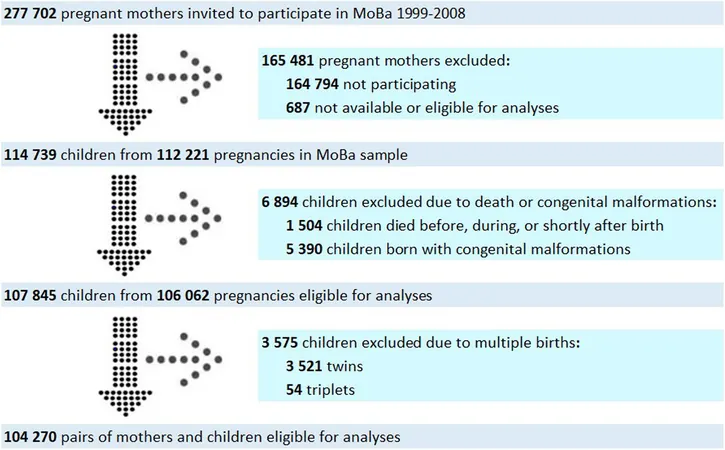
New Study Links Maternal Immune Conditions to Higher ADHD Risk in Children
2025-07-01
Author: John Tan
ADHD in Children: The Startling Statistics
Attention-deficit hyperactivity disorder (ADHD) is one of the most prevalent psychiatric disorders in childhood, affecting 5.4% of boys and 2.1% of girls in Norway by age 12. While genetics and environmental factors are known contributors, recent research is uncovering the potential roles of maternal immune-mediated conditions during pregnancy.
Unpacking the Immune Connection to ADHD
Researchers are increasingly focusing on how maternal health impacts offspring, particularly in the realm of immune-related conditions. This groundbreaking study categorizes maternal immune conditions into two main groups: 1) allergic conditions such as asthma and allergies, and 2) autoimmune disorders including rheumatoid arthritis and Type 1 diabetes. The distinction is crucial, as allergic conditions tend to produce strong immune responses to external stimuli, while autoimmune disorders see the immune system mistakenly attack the body.
The Overlap and Impact on Development
It's important to note that individuals with one type of immune condition often have another. This overlap may complicate our understanding but highlights significant underlying biological mechanisms, including inflammation and immune cell activation that may influence fetal development. Past studies have indicated that these immune conditions can lead to increased risks of developing ADHD.
Investigation Findings Reveal Shocking Insights
In this expansive study, which examined data from over 104,000 mother-child pairs in Norway, researchers sought to determine the influence of maternal immune conditions on ADHD risk. The results were alarming: maternal asthma raised the risk of ADHD by 47%, while any maternal allergy increased it by 20%. Endocrine conditions, particularly Type 1 diabetes, were also significant, showing a 150% higher risk.
Maternal vs. Paternal Influence: An Eye-Opening Comparison
Perhaps even more intriguing is the contrast between maternal and paternal effects. The study found that maternal immune conditions were more strongly associated with ADHD than paternal ones, suggesting a more profound impact of maternal health on fetal brain development during pregnancy.
The Role of the Placenta and Immune Activation
How exactly do maternal conditions heighten ADHD risk? One theory suggests that immune activation might interfere with fetal brain development through placental interactions. The transfer of maternal antibodies and the mother's immune profile could critically alter fetal development, potentially leading to neurodevelopmental disorders like ADHD.
Unraveling the Potential Mechanisms: A Multitude of Factors
Multiple mechanisms seem to be at play, including maternal inflammation, the types of immune cells involved, and genetic interactions. The study emphasizes the need for further research to delineate how these maternal conditions affect fetal brain development and contribute to ADHD.
Conclusion: A Call to Action for Maternal Health
This study adds to a growing body of evidence emphasizing the critical need for maternal health management before and during pregnancy. These findings could transform how we approach women's health, particularly as they relate to the implications for their children’s mental health.



 Brasil (PT)
Brasil (PT)
 Canada (EN)
Canada (EN)
 Chile (ES)
Chile (ES)
 Česko (CS)
Česko (CS)
 대한민국 (KO)
대한민국 (KO)
 España (ES)
España (ES)
 France (FR)
France (FR)
 Hong Kong (EN)
Hong Kong (EN)
 Italia (IT)
Italia (IT)
 日本 (JA)
日本 (JA)
 Magyarország (HU)
Magyarország (HU)
 Norge (NO)
Norge (NO)
 Polska (PL)
Polska (PL)
 Schweiz (DE)
Schweiz (DE)
 Singapore (EN)
Singapore (EN)
 Sverige (SV)
Sverige (SV)
 Suomi (FI)
Suomi (FI)
 Türkiye (TR)
Türkiye (TR)
 الإمارات العربية المتحدة (AR)
الإمارات العربية المتحدة (AR)